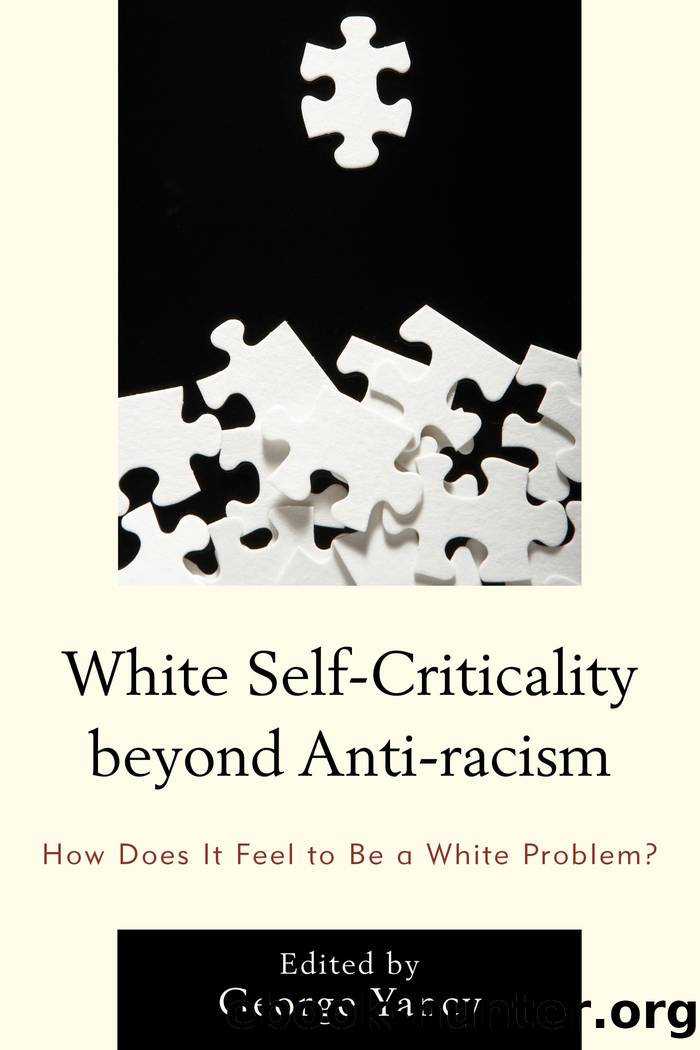White Self-Criticality Beyond Anti-Racism: How Does It Feel to Be a White Problem? by George Yancy

Author:George Yancy [Yancy, George]
Language: eng
Format: epub
Tags: social, Social Science, undefined, philosophy, Discrimination
ISBN: 9780739189498
Google: MiLFoQEACAAJ
Publisher: Lexington Books
Published: 2015-11-15T00:15:29.704522+00:00
Chapter 9
Being a White Problem and Feeling It
Bridget M. Newell
To the real question, âHow does it feel to be a problem,â I answer seldom a word. And yet, being a problem is a strange experienceâpeculiar, even for one who has never been anything else save perhaps in boyhood and in Europe.ââW. E. B. Du Bois[1]
In the early 1900s, W. E. B. Du Bois explored what it meant and how it felt to be seen as a problem due to his race.[2] Now, little more than a century later, I have been asked to âflip the script,â to consider what it means to be a problem due to my race. What, from my perspective, does it mean and how does it feel to be a white problem?
For a long time I considered various ways to approach this question, and I grappled with the important, yet daunting request that I include in my responseâas Du Bois didâsome of my own personal history in coming to see whiteness, including my own whiteness, as a problem. Like any academic, as part of my planning process, I went to the source, Du Boisâs own words. I was struck by the fact that I and many other white people could begin the conversation using the exact same words as Du Bois. To the question, âHow does it feel to be a white problem?â I, like many whites, âanswer seldom a word.â
Of course, this question is not usually posed in such an explicit fashion to white people, but it does arise in multiple forms, and when it does, we whites are often silent. We answer seldom a word. We cannot or do not want to answer. Unlike Du Bois, however, we whites do not live with constant reminders that we are seen as problems due to our race. We do not usually explore how it feels or what it means to be white or âhaveâ a race. When we do address race, the focus is on people of color. That is, race is about black people, or Latinos, or . . . it is not about whites. Moreover, within the context of racism, if the idea of whites or whiteness arises, we focus on other whitesâthose racist whitesâbut not ourselves.
Given this, we âsay seldom a wordâ because the idea of having to explore our own whiteness, let alone the idea that we ourselves might be a problem due to our race/whiteness, does not occur to us.
Download
This site does not store any files on its server. We only index and link to content provided by other sites. Please contact the content providers to delete copyright contents if any and email us, we'll remove relevant links or contents immediately.
| Anthropology | Archaeology |
| Philosophy | Politics & Government |
| Social Sciences | Sociology |
| Women's Studies |
Born to Run: by Christopher McDougall(7045)
The Leavers by Lisa Ko(6893)
iGen by Jean M. Twenge(5351)
Sapiens by Yuval Noah Harari(5280)
The Kite Runner by Khaled Hosseini(5061)
Spare by Prince Harry The Duke of Sussex(5053)
Machine Learning at Scale with H2O by Gregory Keys | David Whiting(4103)
Bullshit Jobs by David Graeber(4064)
Never by Ken Follett(3761)
Goodbye Paradise(3709)
Livewired by David Eagleman(3663)
Fairy Tale by Stephen King(3192)
A Dictionary of Sociology by Unknown(2998)
Harry Potter 4 - Harry Potter and The Goblet of Fire by J.K.Rowling(2971)
The Social Psychology of Inequality by Unknown(2922)
The Club by A.L. Brooks(2851)
0041152001443424520 .pdf by Unknown(2769)
Will by Will Smith(2769)
People of the Earth: An Introduction to World Prehistory by Dr. Brian Fagan & Nadia Durrani(2690)
